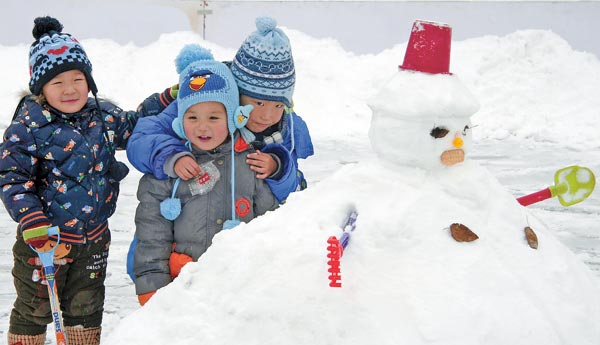More snow expected in next three days in northern China
Updated: 2012-12-15 02:40
By Xu Wei in Beijing and Shao Wei in Urumqi (China Daily)
|
|||||||||||
|
 Children have fun in the snow in Chengde, Hebei province, on Friday. Snow is expected to continue affecting parts of northern and northeastern China in the next three days as fog and heavy snow disrupted road traffic and caused flight delays and cancellations on Friday. [Wang Kun / Xinhua] |
Traffic disrupted; flights delayed and canceled
Snow is expected to continue to affect parts of northern and northeastern China in the next three days, according to forecasters.
Fog and heavy snowfall disrupted traffic and caused flight delays and cancellations on Friday, with snow affecting Beijing and Tianjin municipalities and Hebei, Henan and Shandong provinces.
Light to moderate snowfall and sleet are expected to affect parts of northern and northeastern provinces in the next three days, the National Meteorological Center said on Friday.
A total of 109 flights were canceled and 61 delayed for more than an hour at Beijing Capital International Airport as airport crews worked to removed snow and ice from aircraft on Friday morning, the airport said on its official micro blog.
Dense fog has been blamed for a car accident on Friday morning in which nine people were killed and 69 injured in Pingyin county, Shandong province, on the Jinan-Guangzhou Expressway, Xinhua News Agency reported.
Lingering fog caused the closure of more than 60 highway access points in the province on Friday.
In Beijing, at least three highways were closed on Thursday night due to heavy snowfalls and ice. Authorities mobilized more than 363,000 people across the municipality to clear snow from roads, Beijing Municipal Commission of City Administration and Environment said.
Gao Guangjun, a sanitation worker in Beijing's Chaoyang district, said he and his colleagues began shoveling snow at about 4:30 am on Friday. They were still on duty at 4 pm.
The snow also saw an increase in the number of people requiring hospital treatment in Beijing. Ren Zhilei, a surgeon at China-Japan Friendship Hospital, said: "Today, I had about 10 patients who tripped and fell on the road. Three of them broke their legs and needed immediate operations."
In Henan province, authorities banned vehicles with more than seven seats from the highways to prevent accidents involving large numbers of casualties.
Heavy snowfalls also affected Northwest China's Xinjiang Uygur autonomous region and North China's Inner Mongolia autonomous region.
The snow hit northern areas of Xinjiang from Thursday, blocking roads in many mountainous areas and causing problems for herders as livestock faced food shortages, Xinhua reported.
Wang Taozhong, a snow-clearing contractor in Urumqi, the region's capital, said he has earned 28,000 yuan ($4,480) for clearing snow this winter for two companies but can barely make ends meet due to frequent snowfalls.
"I've paid nearly 6,000 yuan to workers for snow-clearing. It usually snows 15 to 20 times (in Urumqi) but this year it has snowed too much. It looks as though I will barely make a profit."
Snow-clearing workers generally work in the evening to ensure traffic flows smoothly next day.
Wang Ling, a 51-year-old who has worked as a sanitation worker in downtown Urumqi for more than six years, said: "I only sleep for three to four hours in the evening if it snows. I am ready to rush out to clear it."
Xu Wei, a doctor in the orthopedics division of the PLA General Hospital in Urumqi, said continuous snowfalls and icy roads have brought more patients to the hospital than usual.
Dense fog was expected to affect northern and central areas on Friday night and Saturday morning, with the National Meteorological Center issuing a blue alert for fog, the lowest in the three-level alert system. In parts of Shandong, Henan and Hebei provinces, visibility is expected to be less than 200 meters.
Ou Hailin in Beijing and Wang Qian in Jinan contributed to this story.
Related Stories
Snow in Beijing affects traffic 2012-12-14 13:19
Heavy snow hits N China, closing roads 2012-12-14 00:59
Snow to hit Central, East China 2012-12-12 19:49
Heavy fog, snow disrupt traffic in NE China 2012-12-03 15:04
Today's Top News
President Xi confident in recovery from quake
H7N9 update: 104 cases, 21 deaths
Telecom workers restore links
Coal mine blast kills 18 in Jilin
Intl scholarship puts China on the map
More bird flu patients discharged
Gold loses sheen, but still a safe bet
US 'turns blind eye to human rights'
Hot Topics
Lunar probe , China growth forecasts, Emission rules get tougher, China seen through 'colored lens', International board,
Editor's Picks

|

|

|

|

|

|





